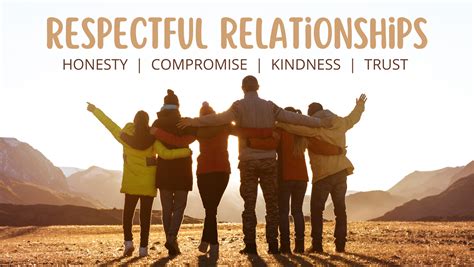Respectful Relationships: Setting Boundaries the Right Way
Healthy relationships thrive on mutual respect, understanding, and clear communication. A crucial element often overlooked is the art of setting boundaries. Boundaries aren't about being selfish; they're about protecting your emotional, physical, and mental well-being while fostering a stronger, more respectful connection with others. This article explores the importance of setting boundaries in relationships, providing practical strategies for doing so respectfully and effectively.
Why Are Boundaries Important in Relationships?
Boundaries act as a protective shield, defining what you're comfortable with and what you're not. Without them, you risk feeling overwhelmed, resentful, and taken advantage of. Establishing clear boundaries:
- Protects your well-being: They prevent others from crossing your limits, reducing stress and promoting a sense of self-respect.
- Enhances communication: Clearly defined boundaries facilitate open and honest communication, minimizing misunderstandings and conflict.
- Strengthens relationships: Ironically, setting boundaries can strengthen relationships by fostering mutual respect and trust. Knowing your limits allows others to respect them, creating a healthier dynamic.
- Promotes self-awareness: The process of identifying and setting boundaries helps you gain a deeper understanding of your needs and values.
How to Set Boundaries Respectfully: A Step-by-Step Guide
Setting boundaries effectively involves more than simply stating your limits; it requires careful consideration and communication. Here's a practical guide:
1. Identify Your Needs and Limits: Before you can communicate your boundaries, you must first understand them. Reflect on your past experiences, identify recurring patterns of discomfort, and pinpoint areas where you feel your boundaries have been violated. Consider both big and small issues.
2. Communicate Clearly and Directly: When expressing your boundaries, use "I" statements to avoid sounding accusatory. For example, instead of saying "You always interrupt me," try "I feel unheard when I'm interrupted. I need you to let me finish my thoughts."
3. Be Assertive, Not Aggressive: Assertiveness involves expressing your needs clearly and respectfully, without being passive or aggressive. Aggressive communication can push people away, while passive communication allows your boundaries to be continually disregarded. The goal is to find a balance.
4. Be Prepared for Resistance: Some people may resist your boundaries, especially if they're used to getting their way. Remain firm and reiterate your limits calmly and persistently. It's okay to repeat yourself.
5. Enforce Your Boundaries Consistently: Setting a boundary once isn't enough. You must consistently enforce it to demonstrate its importance. This means following through with your stated consequences if your boundaries are violated.
What If Someone Doesn't Respect My Boundaries?
If someone consistently disregards your boundaries despite your efforts, you might need to reassess the relationship. Repeated boundary violations indicate a lack of respect and can be detrimental to your well-being. You might consider:
- Reiterating your boundaries: Calmly but firmly explain the consequences of continued disregard.
- Limiting contact: Reduce the time you spend with the person, or even temporarily distance yourself.
- Seeking support: Talk to a trusted friend, family member, therapist, or counselor for guidance and support.
- Ending the relationship: In some cases, ending the relationship may be necessary to protect your well-being.
Frequently Asked Questions (FAQ)
How do I set boundaries with family members who are used to getting their way?
Setting boundaries with family can be challenging due to pre-existing dynamics. Be patient and prepared for resistance. Start with smaller boundaries and gradually introduce more significant ones as you gain confidence. Focus on your feelings and needs, expressing them calmly and respectfully.
What if my partner doesn't understand my need for space?
Clearly communicate your need for personal time and space, explaining how it benefits both of you. Explain that it's not about them; it's about maintaining your independence and well-being, which strengthens your relationship. Suggest specific times or activities when you need this space.
Is it selfish to set boundaries?
No, setting boundaries is not selfish; it's essential for your emotional and mental well-being. It's about prioritizing your needs and respecting your limits, which allows you to be a better partner, friend, and individual.
How can I deal with guilt when setting boundaries?
Guilt often stems from societal expectations or a fear of disappointing others. Remind yourself that setting boundaries is an act of self-care and respect. Prioritize your own well-being; you deserve to have your limits respected.
By understanding the importance of boundaries and implementing these strategies, you can cultivate respectful, healthy, and fulfilling relationships. Remember, setting boundaries is not about control; it's about mutual respect and the preservation of your well-being.

